
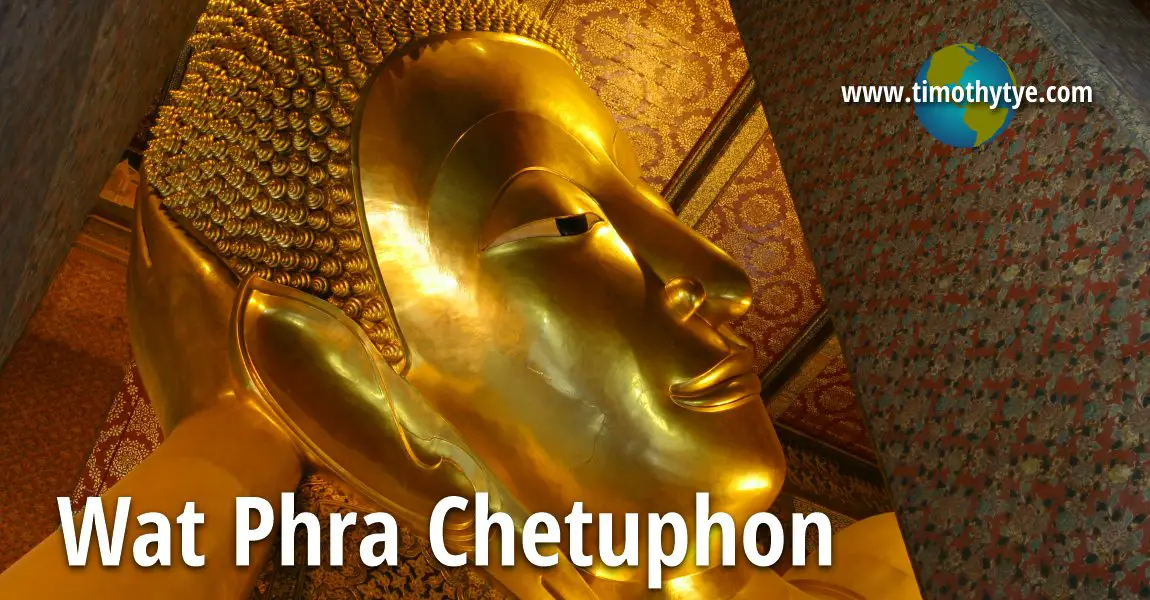 Signboard with opening hours of Wat Phra Chetuphon. (28 October, 2006)
Signboard with opening hours of Wat Phra Chetuphon. (28 October, 2006)
Wat Phra Chetuphon Vimolmangklararm Rajwaramahawihan (GPS: 13.74657, 100.49315; Thai: วัดพระเชตุพนวิมลมังคลาราม ราชวรมหาวิหาร
 ), better known simply as Wat Pho, or the Temple of the Reclining Buddha, is the oldest and largest Buddhist temple in Bangkok. Its full name is Wat Phra Chetuphon Vimolmangklararm Rajwara Mahaviharn. It covers an area of 50 rai, equivalent to some 80,000 square meters or twenty acres, immediately to the south of the Grand Palace. More than just a temple, it is the renowned birthplace of Thai message, and it continues to play a role as a center of education for traditional Thai medicine.
), better known simply as Wat Pho, or the Temple of the Reclining Buddha, is the oldest and largest Buddhist temple in Bangkok. Its full name is Wat Phra Chetuphon Vimolmangklararm Rajwara Mahaviharn. It covers an area of 50 rai, equivalent to some 80,000 square meters or twenty acres, immediately to the south of the Grand Palace. More than just a temple, it is the renowned birthplace of Thai message, and it continues to play a role as a center of education for traditional Thai medicine.The history of Wat Pho predates that of Bangkok itself. Going back to the 16th century, there was already a Buddhist shrine here by the name of Wat Photaram. It is the short form of "Photaram" that the temple continues to be known in English as Wat Pho. King Rama I changed the name to Wat Chetuphon in 1801, and that's the name it is known in Thai.
The most popular part of Wat Pho is the Vihara of the Reclining Buddha, or Phra Buddhasaiyas. This is where the Great Reclining Buddha is located.
Within the ubosot (or bot, monks' ordination hall) of Wat Pho is a bronze Buddha image. It is called the Phra Tang Pha Thip, and is a Buddha in a meditative pose. It was in the Ayutthaya style, and was salvaged from Ayutthaya by King Rama I's brother. It is one of the many Buddha statues which the Thais managed to retrieved from Ayutthaya after it was destroyed by the Burmese.
Within the western courtyard of Wat Pho are a jungle of chedi, or Buddhist spires, of which there are four big ones, called the Phra Maha Chedi, stand out over the rest. They are each 41 meters tall, and arranged three in a row with one at the central back. That one at the central back is the most important. It contains the sacred Buddha image from Ayutthaya, the Phra Si Sanphet - which I believe, comes from Wat Si Sanphet in the former Royal Palace of Ayutthaya. The chedi to the north was built by King Rama III to enshrine the ashes of King Rama II. He also built the chedi to the south to shrine his own remains. The bright, blue-tile chedi was built by King Rama IV, although I am not sure of the purpose.
Getting to Wat Phra Chetuphon
As there are no Skytrains to Rattanakosin, the easiest way to reach Wat Pho is by taxi. I would stay away from tuk tuks as they cost as much as taxis, their seats block out views, and you have to eat dust all the way. Also, some tuk tuks do take their passengers for a ride, if you know what I mean, and you end up at a jewelry store offering a sales pitch. If you prefer a non-taxi approach, then I'd recommend taking the BTS Skytrain to Saphan Taksin Station (S6). From there, catch an express boat at the Central Pier (Sathorn) to the Tha Tien Pier (N8) pier. From the pier, walk out to Thanon Maharat Road (also written Thanon Maharaj), turn right, walk down Thanon Maharat until the junction of Soi Chetuphon, turn left into Soi Chetuphon. The visitor entrance to Wat Pho along Soi Chetuphon, somewhere half-way down the lane. On the opposite side of the road is Wat Pho's administrative office and monastery for the monks.As you enter Wat Pho, the ticket booth is to your left.
Location: Soi Chetuphon
Boat: Tha Tien Pier (N8)
Opening hours: 8:00am-5:00pm daily
Entrance fees: 50 baht per person
Official Website: https://www.watpho.com
Layout Map of Wat Phra Chetuphon
Sights within the Wat Phra Chetuphon complex
- Entrance Gate ซุ้มประตูทรงมงกุฎ และ ตุ๊กตาจีน


- Southern Viharn พระวิหารทิศใต้


- L-shaped Viharn พระวิหารคด

 and
and 
- Sala Kan Parien (Preaching Hall) ศาลาการเปรียญ


- Crocodile Pond สระจระเข


- Phra Mondop (Library) พระมณฑป


- Phra Maha Chedi Si Ratchakarn (Great Stupas of the Four Kings) พระมหาเจดีย์สี่รัชกาล


- Misakawan (Bodhi Tree) Park สวนมิสกวัน


- Viharn of the Reclining Buddha พระวิหารพระพุทธไสยาส


- Belfry หอระฆัง


- Phra Rabieng (Gallery) พระระเบียง


- Western Viharn พระวิหารทิศตะวันตก


- Northern Viharn พระวิหารทิศเหนือ


- Eastern Viharn พระวิหารทิศตะวันออก


- Phra Ubosot พระอุโบสถ


A visit to Wat Phra Chetuphon
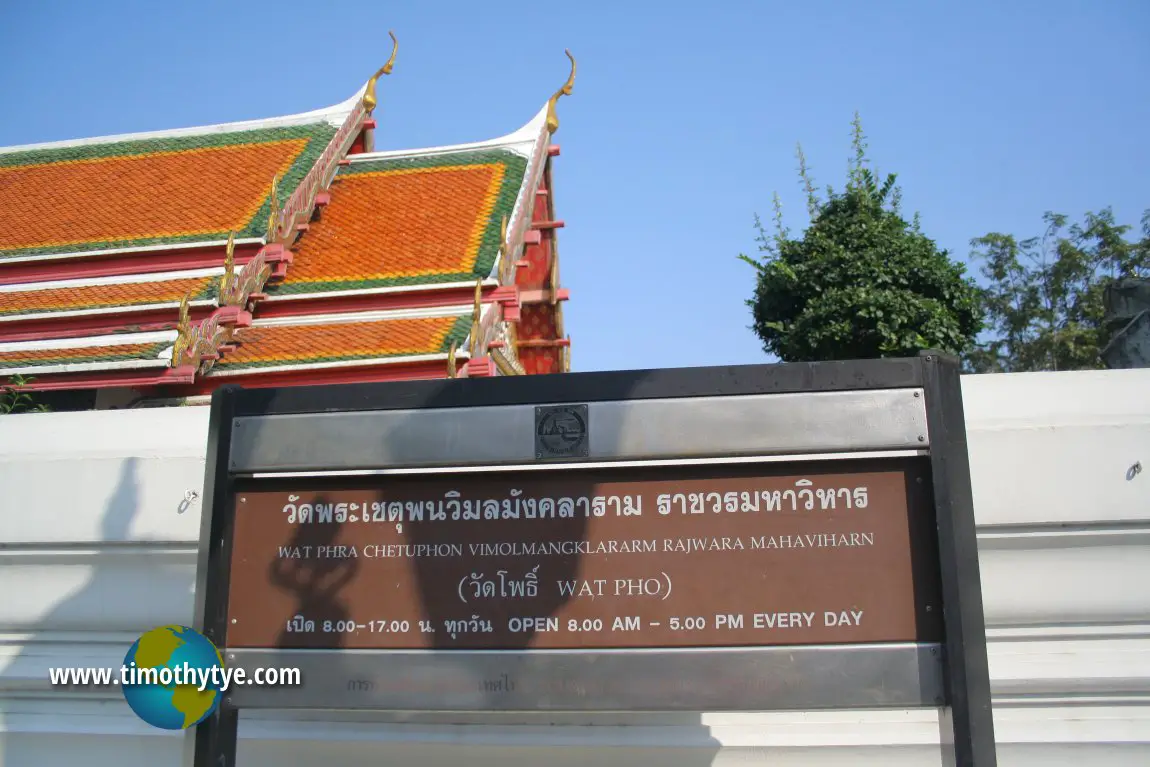 Signboard with opening hours of Wat Phra Chetuphon. (28 October, 2006)
Signboard with opening hours of Wat Phra Chetuphon. (28 October, 2006)
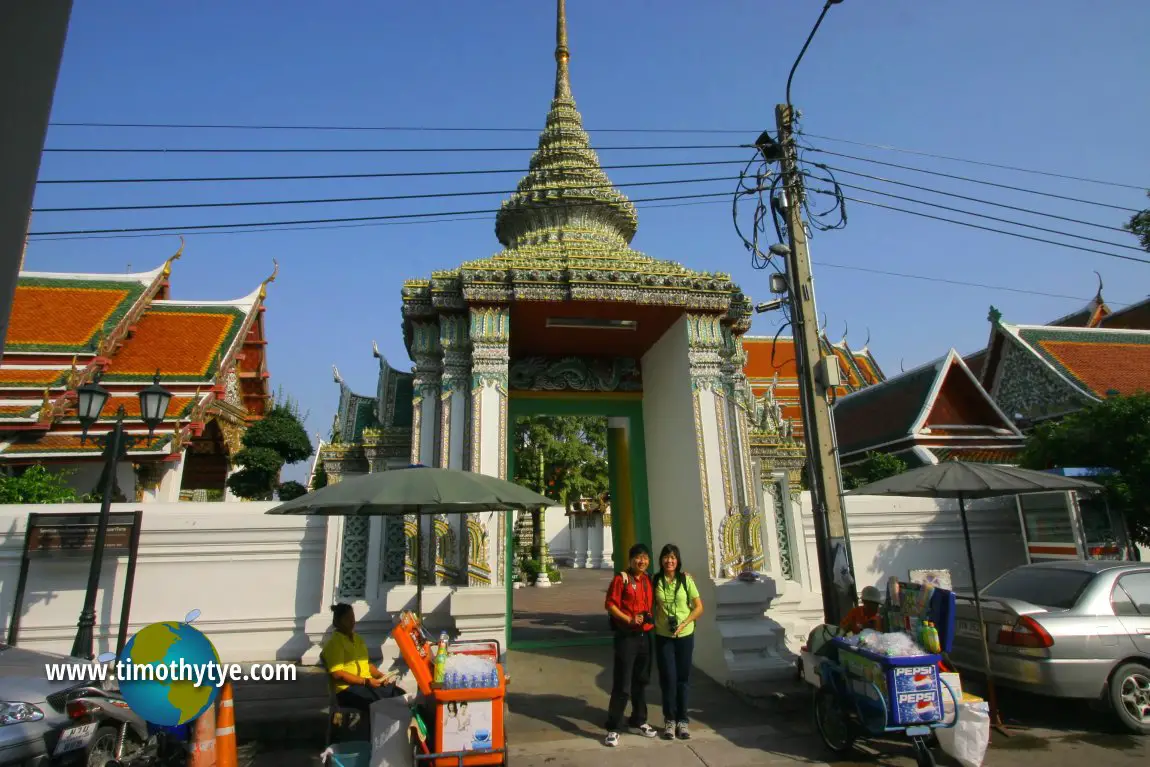 My girlfriend (now wife) Chooi Yoke and I at the entrance of Wat Phra Chetuphon before we entered. (28 October, 2006)
My girlfriend (now wife) Chooi Yoke and I at the entrance of Wat Phra Chetuphon before we entered. (28 October, 2006)
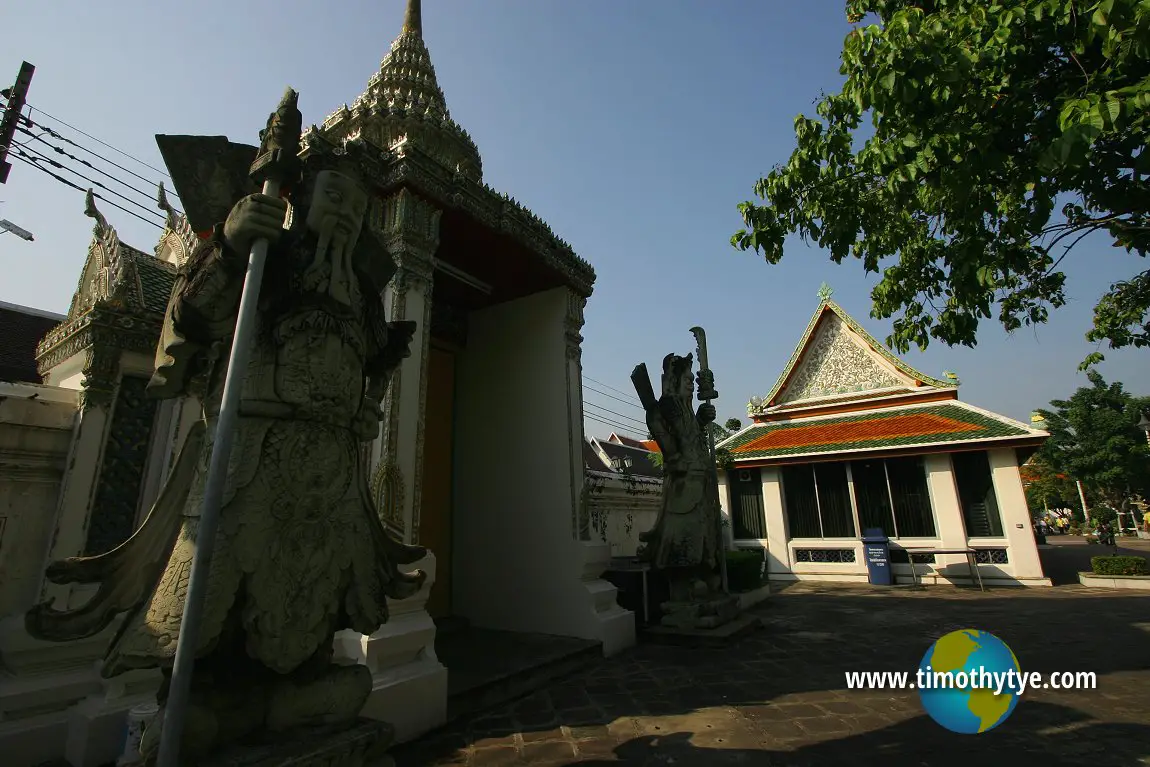 Gate sentinels with Chinese features at Wat Phra Chetuphon. (28 October, 2006)
Gate sentinels with Chinese features at Wat Phra Chetuphon. (28 October, 2006)
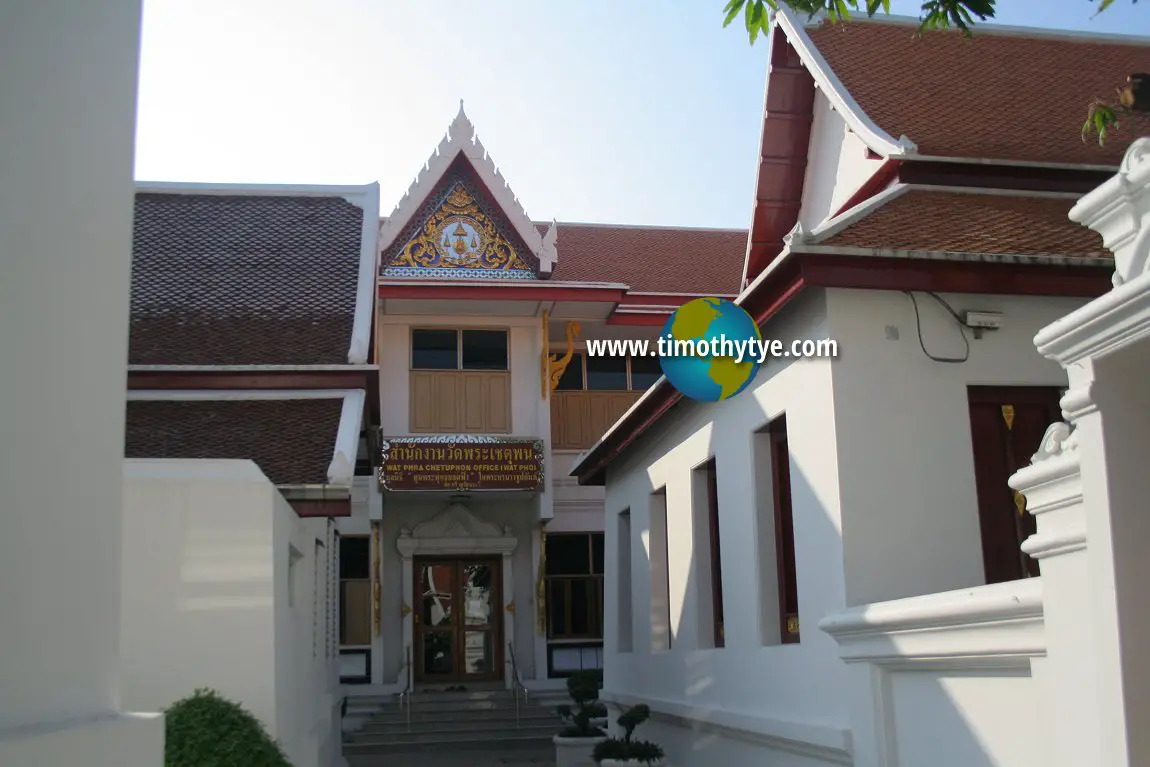 The administrative office of Wat Phra Chetuphon. (28 October, 2006)
The administrative office of Wat Phra Chetuphon. (28 October, 2006)
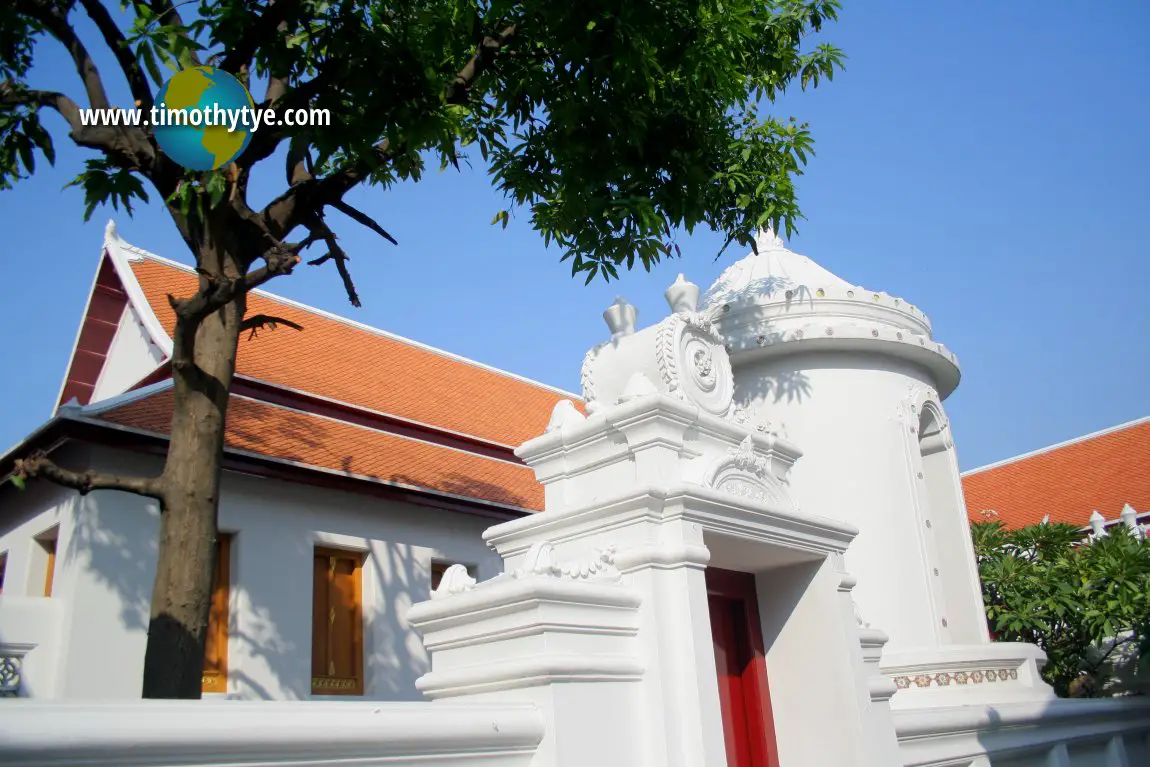 The whitewashed walls of Wat Phra Chetuphon. (28 October, 2006)
The whitewashed walls of Wat Phra Chetuphon. (28 October, 2006)
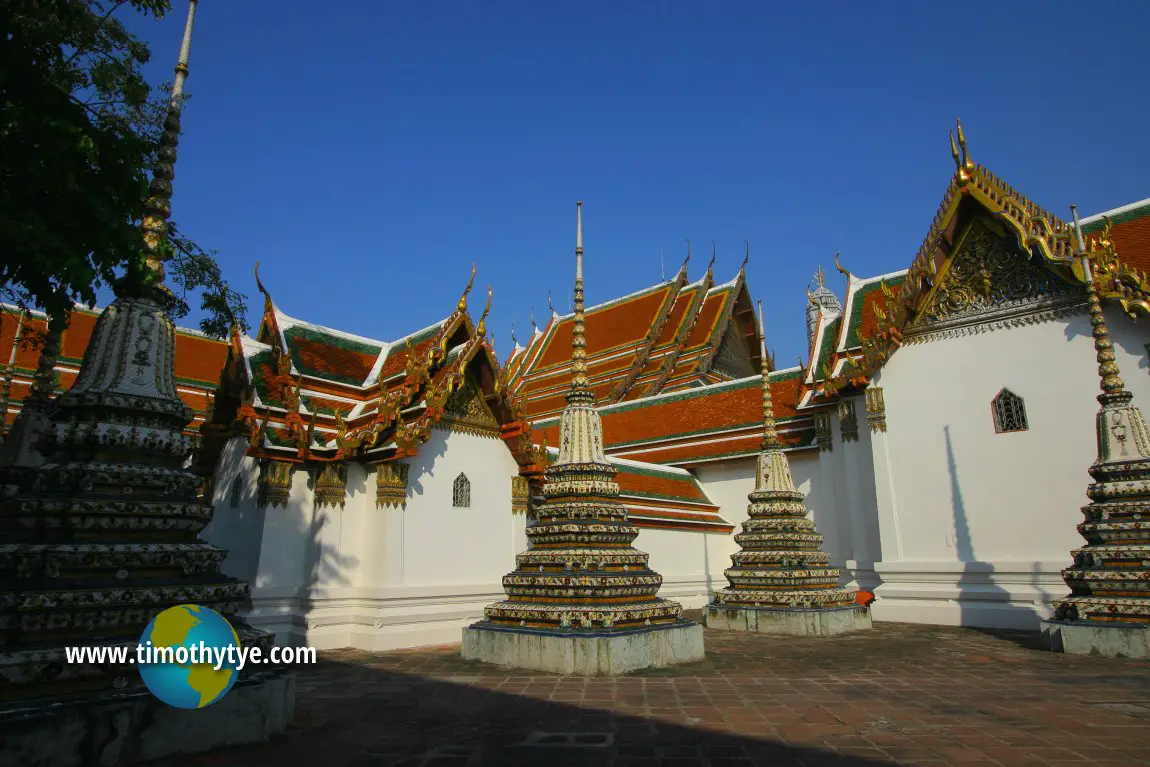 The outer courtyard of Wat Phra Chetuphon, looking towards the Phra Rabieng gallery, with chedis lining the wall. (28 October, 2006)
The outer courtyard of Wat Phra Chetuphon, looking towards the Phra Rabieng gallery, with chedis lining the wall. (28 October, 2006)
 A cluster of five stupas in the outer courtyard of Wat Phra Chetuphon. (28 October, 2006)
A cluster of five stupas in the outer courtyard of Wat Phra Chetuphon. (28 October, 2006)
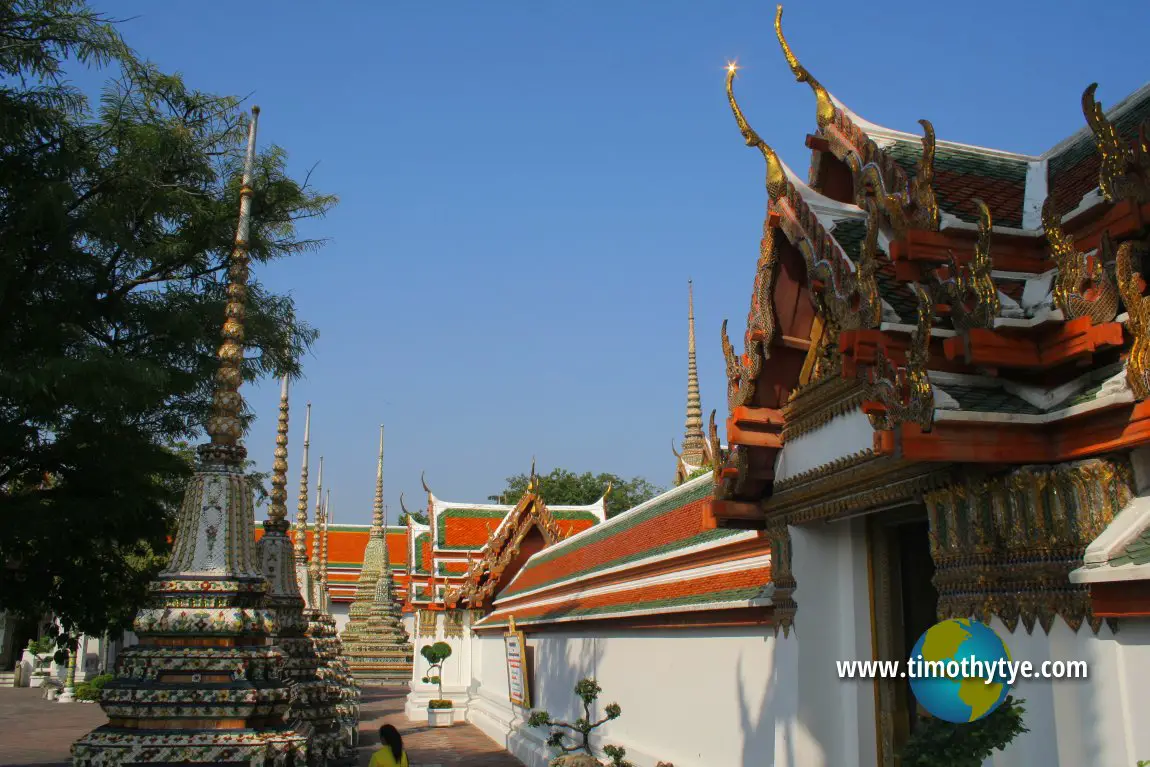 A row of chedis and the whitewashed gallery of Wat Phra Chetuphon. (28 October, 2006)
A row of chedis and the whitewashed gallery of Wat Phra Chetuphon. (28 October, 2006)
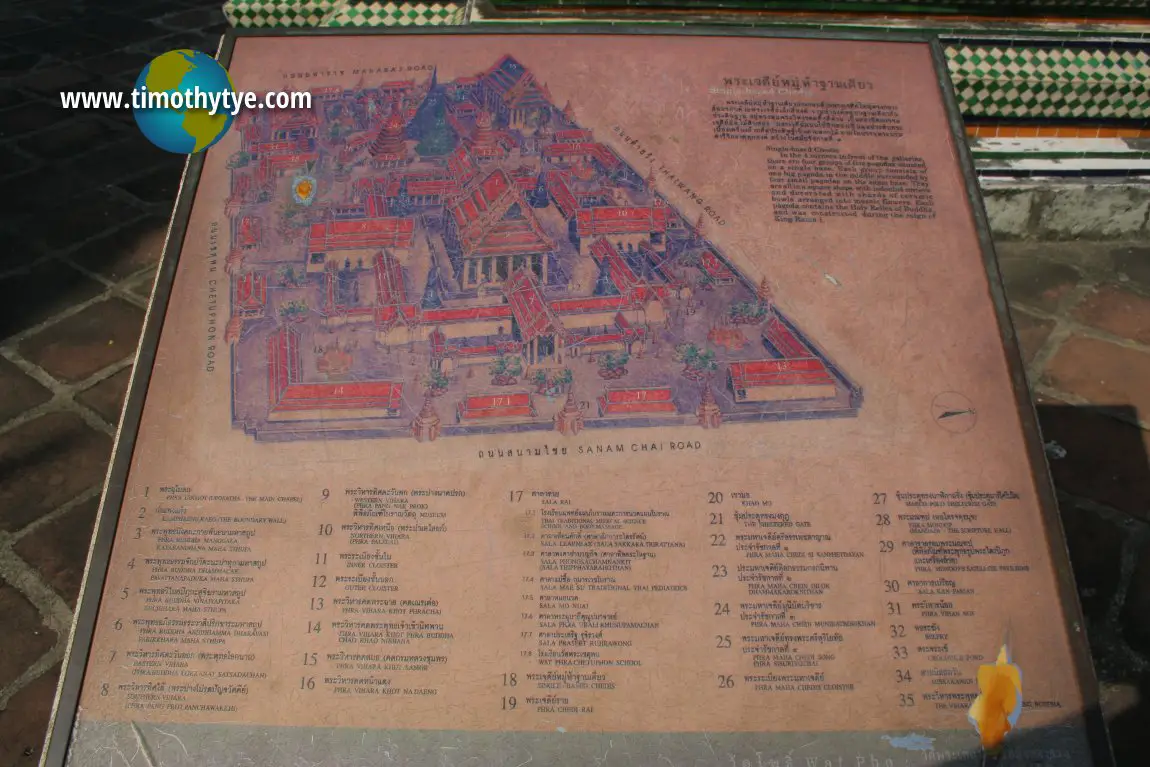 Layout of Wat Phra Chetuphon, viewed from east looking to west. (28 October, 2006)
Layout of Wat Phra Chetuphon, viewed from east looking to west. (28 October, 2006)
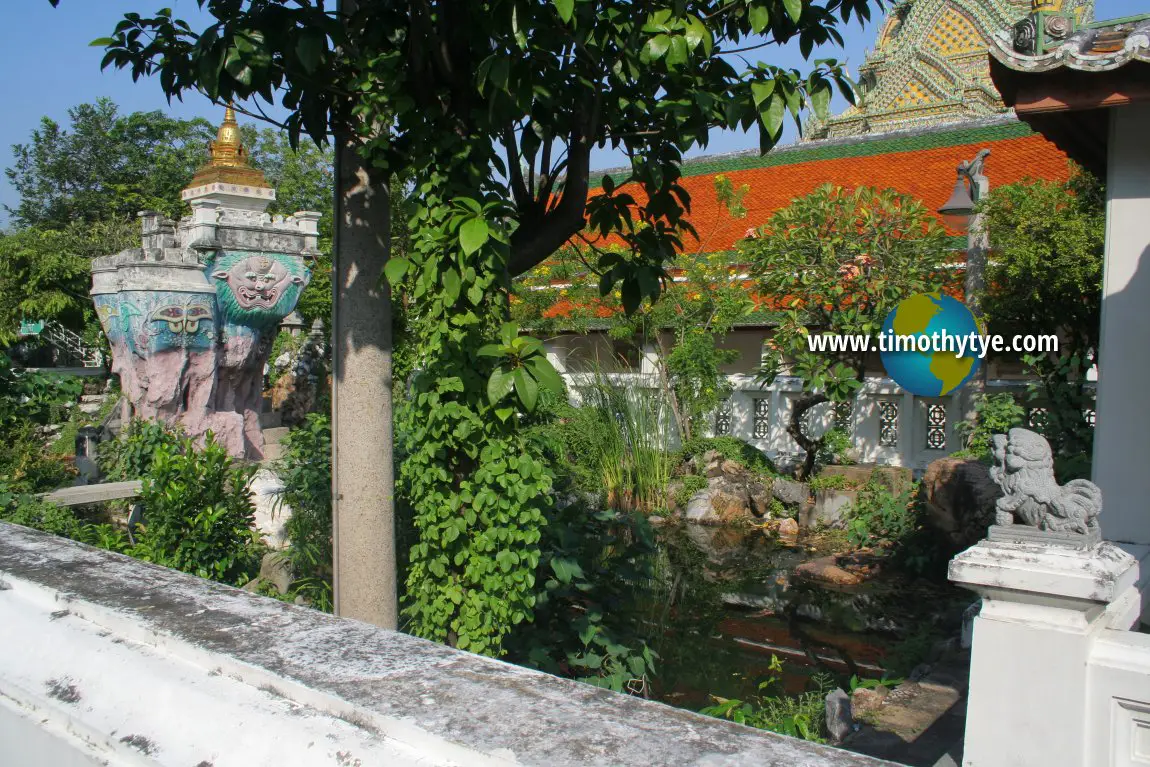 The Crocodile Pond.
The Crocodile Pond.  (28 October, 2006)
(28 October, 2006)
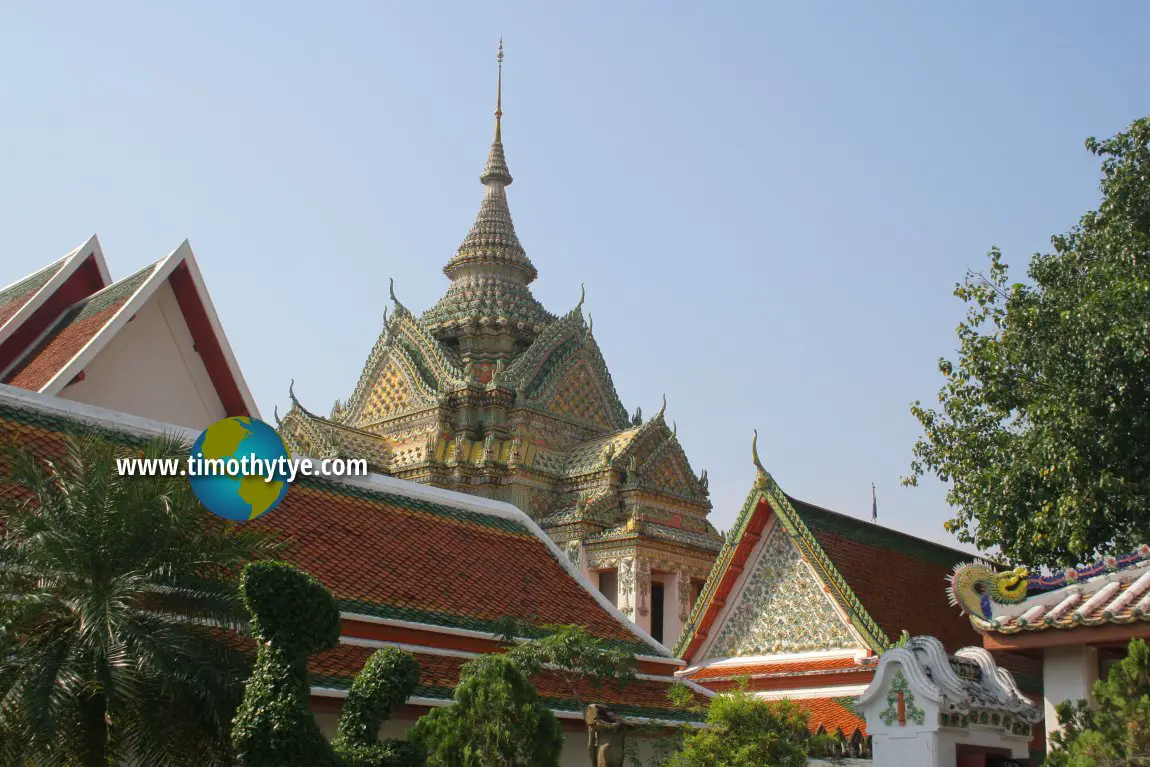 Phra Mondop, the library where Buddhist scriptures are kept.
Phra Mondop, the library where Buddhist scriptures are kept.  (28 October, 2006)
(28 October, 2006)
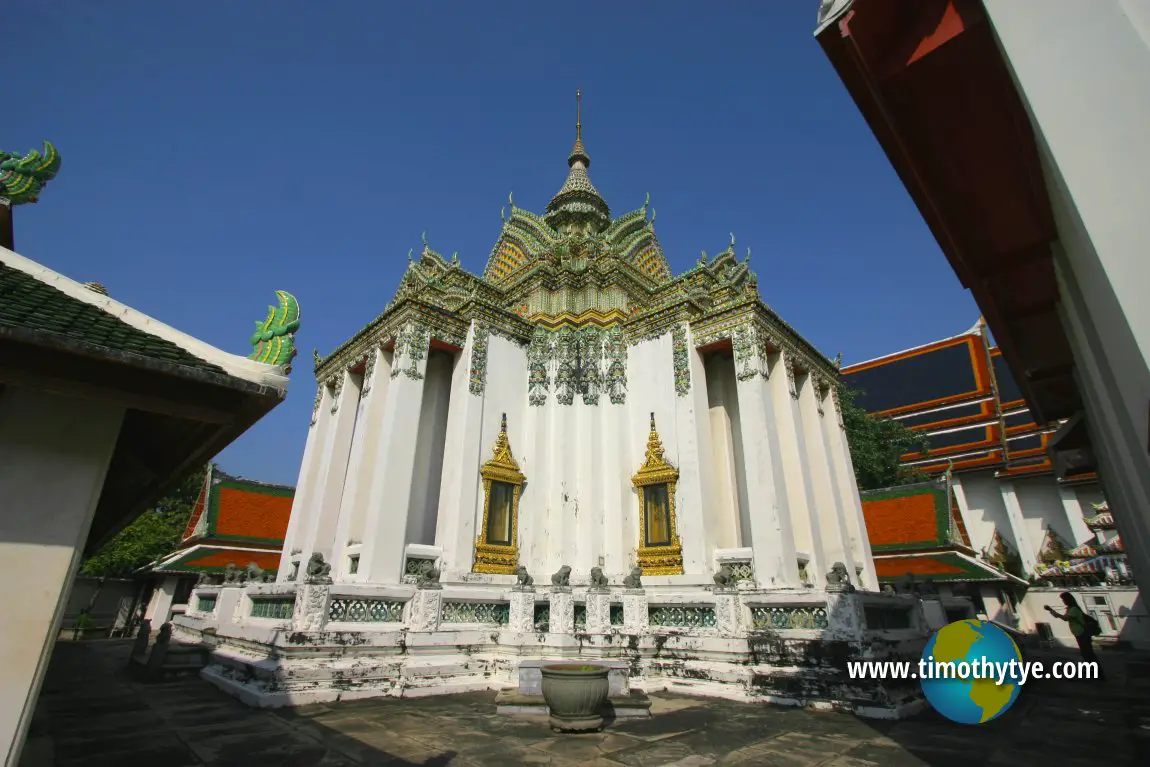 Phra Mondop.
Phra Mondop.  (28 October, 2006)
(28 October, 2006)
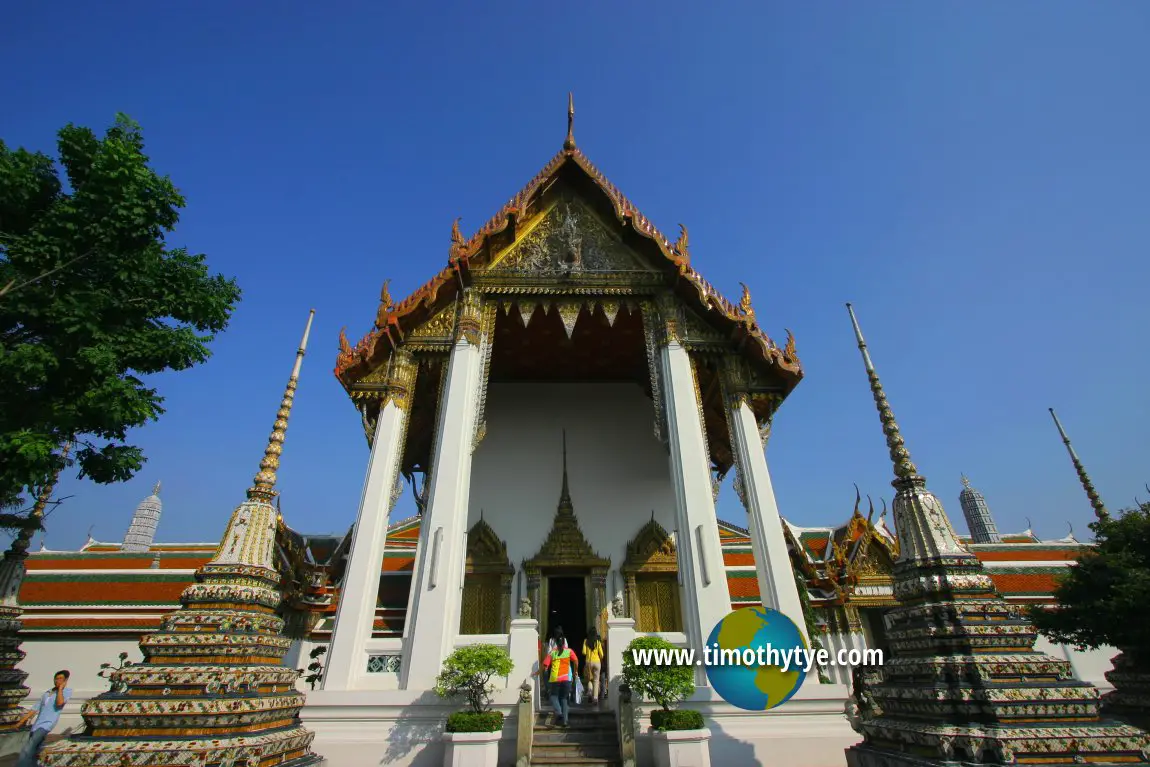 Western Viharn of Wat Phra Chetuphon, seen from its entrance looking east.
Western Viharn of Wat Phra Chetuphon, seen from its entrance looking east.  (28 October, 2006)
(28 October, 2006)
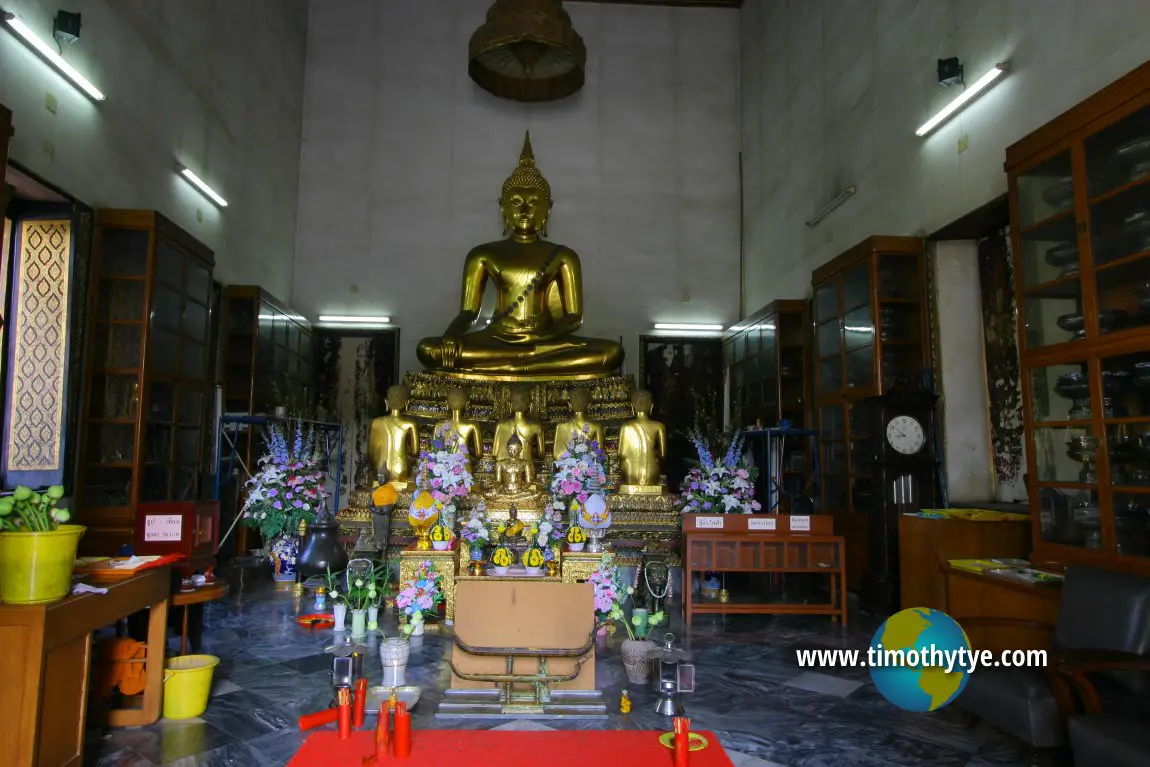 Interior of the Western Viharn.
Interior of the Western Viharn.  (28 October, 2006)
(28 October, 2006)
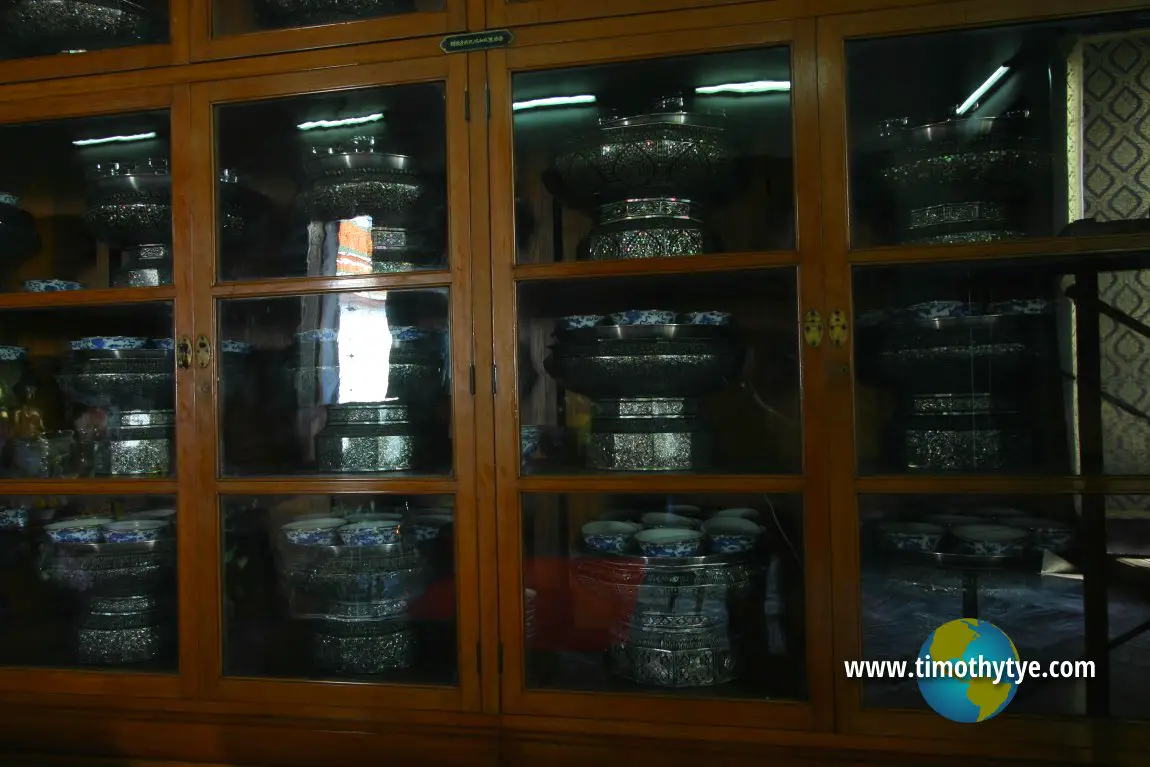 Cabinet in the Western Viharn with mother-of-pearl inlaid lacquered pedestal trays called talum (28 October, 2006)
Cabinet in the Western Viharn with mother-of-pearl inlaid lacquered pedestal trays called talum (28 October, 2006)
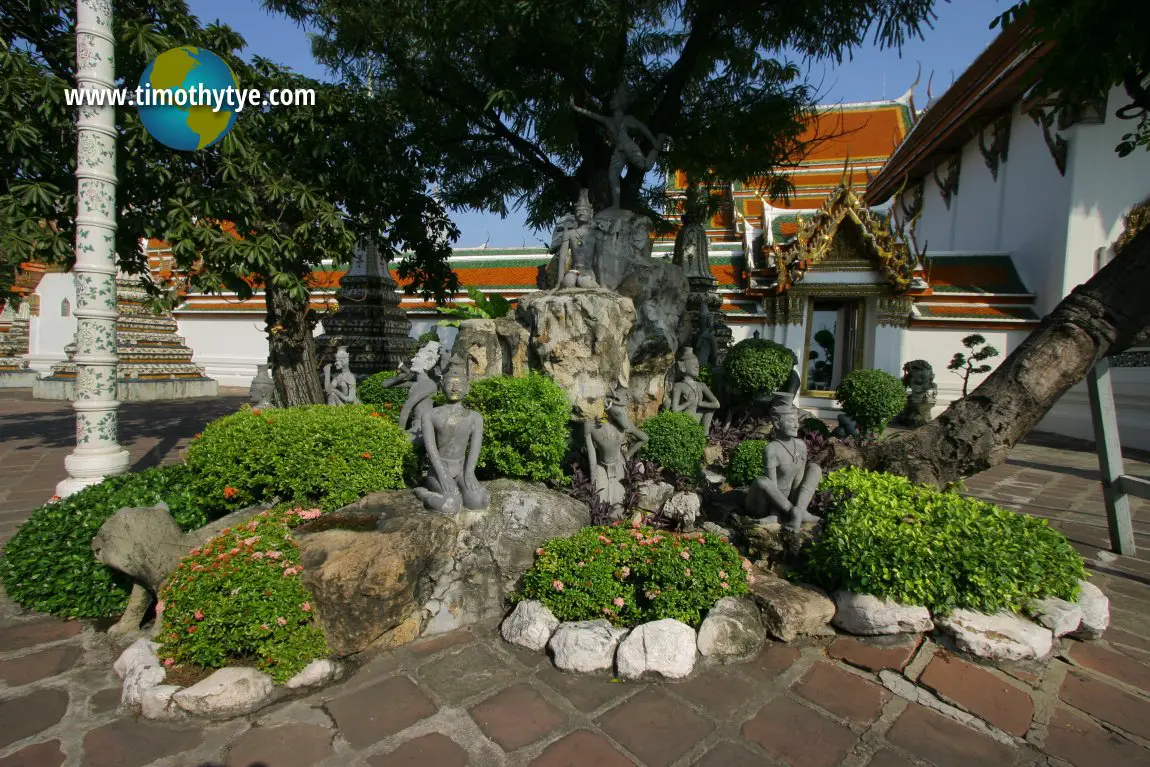 Rock garden in front of the Western Viharn. (28 October, 2006)
Rock garden in front of the Western Viharn. (28 October, 2006)
Located in front of the Western Viharn, this is one of the 24 rock gardens within the Wat Phra Chetuphon complex. It has shrubs such as the ixora, and rocks of different sizes which were relocted from the rock garden of the Grand Palace. The rock gardens were created by King Rama III.
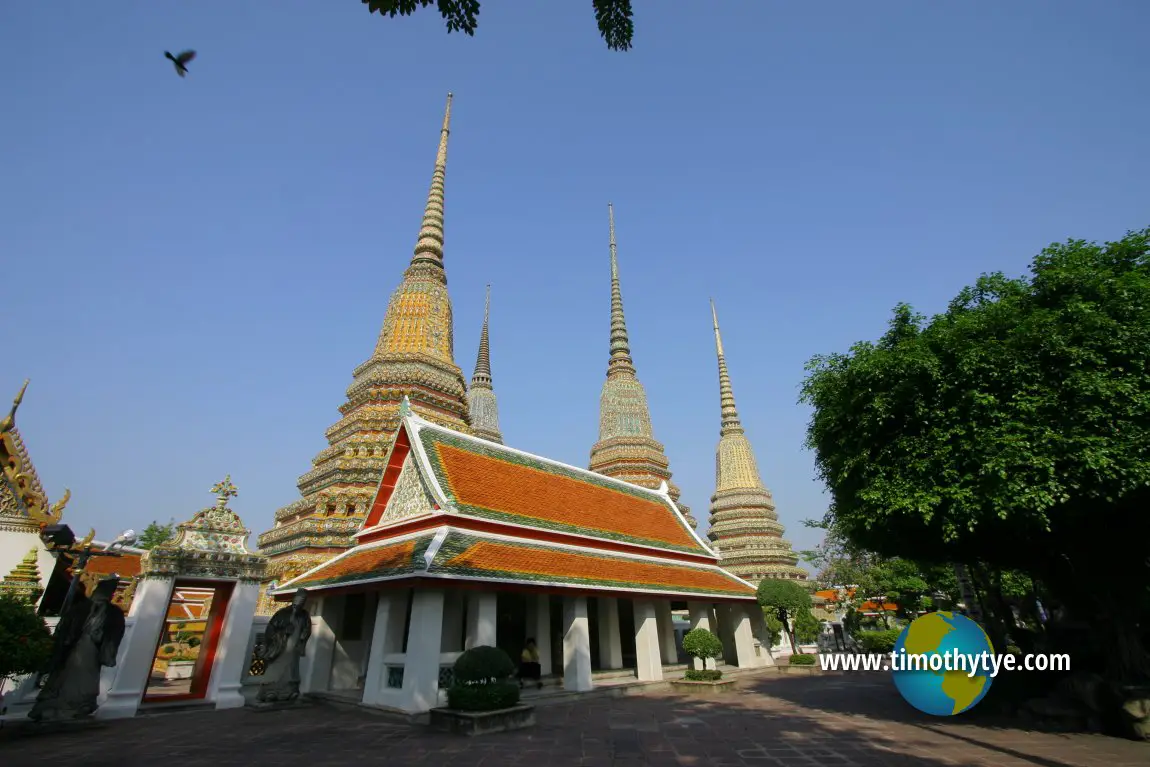 Great Stupas of the Four Kings.
Great Stupas of the Four Kings.  (28 October, 2006)
(28 October, 2006)
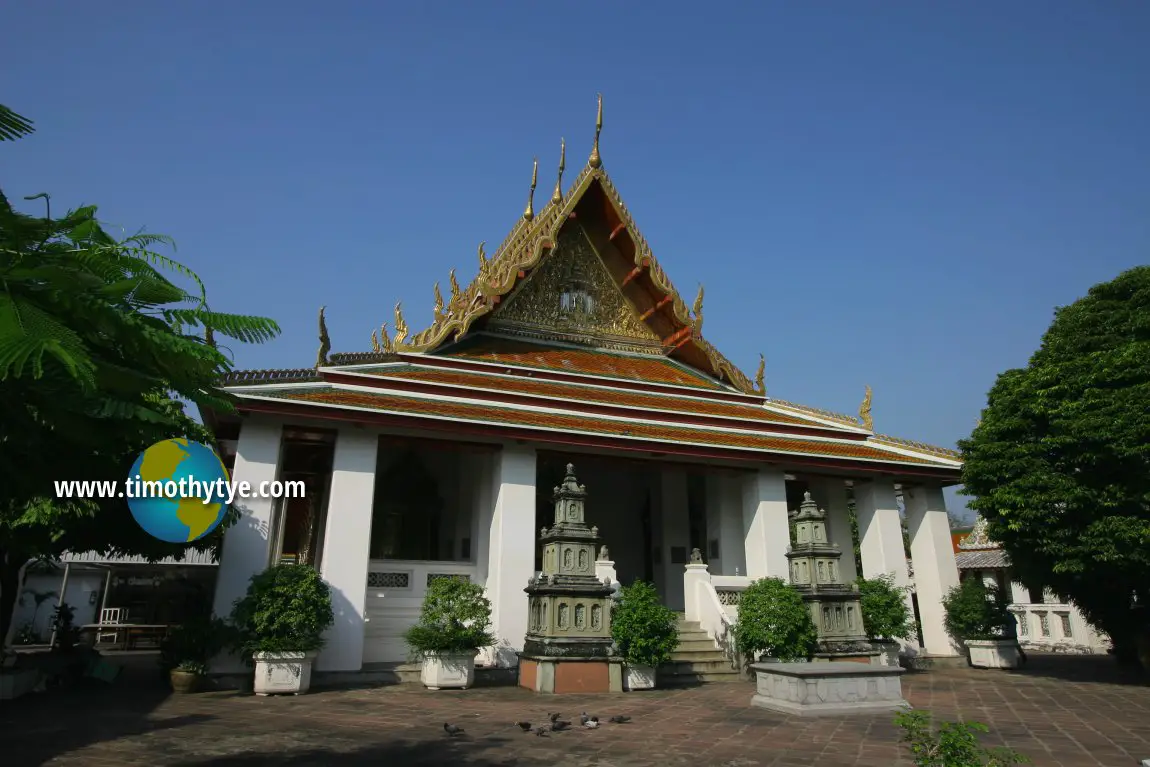 Gateway to the Bodhi Tree courtyard, also called Misakawan Park
Gateway to the Bodhi Tree courtyard, also called Misakawan Park  (28 October, 2006)
(28 October, 2006)
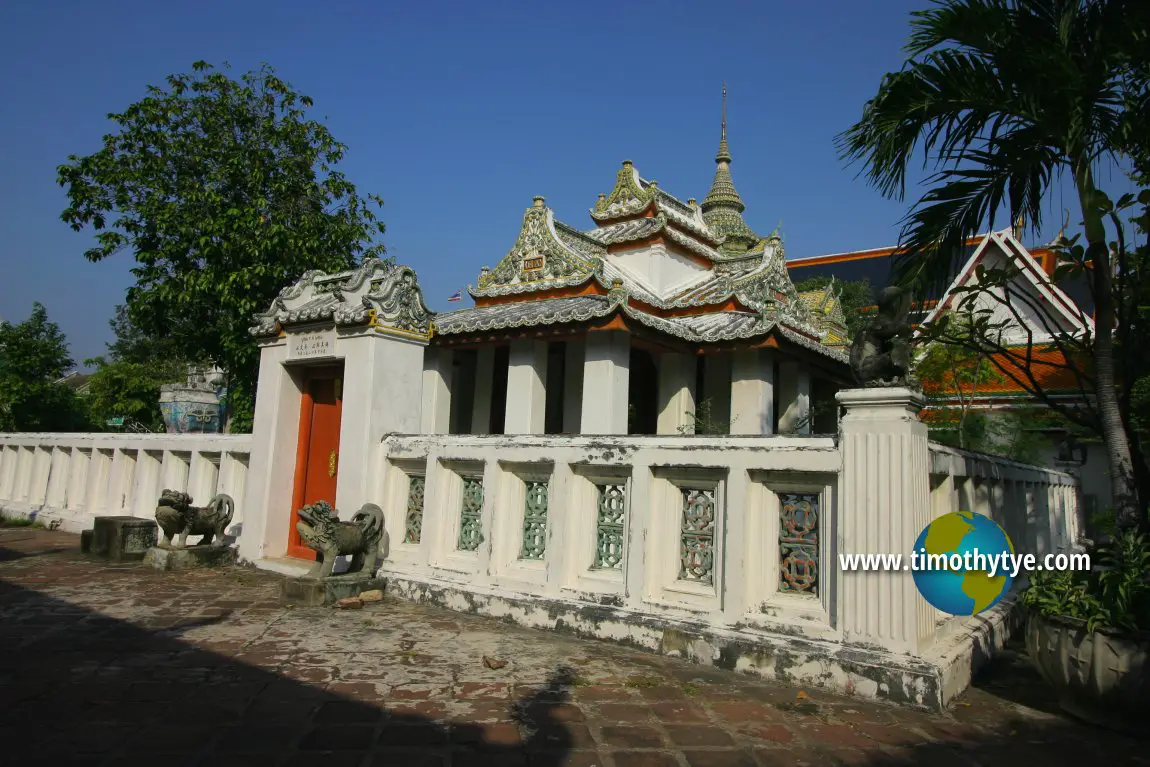 Side view of the gateway to Misakawan Park. (28 October, 2006)
Side view of the gateway to Misakawan Park. (28 October, 2006)
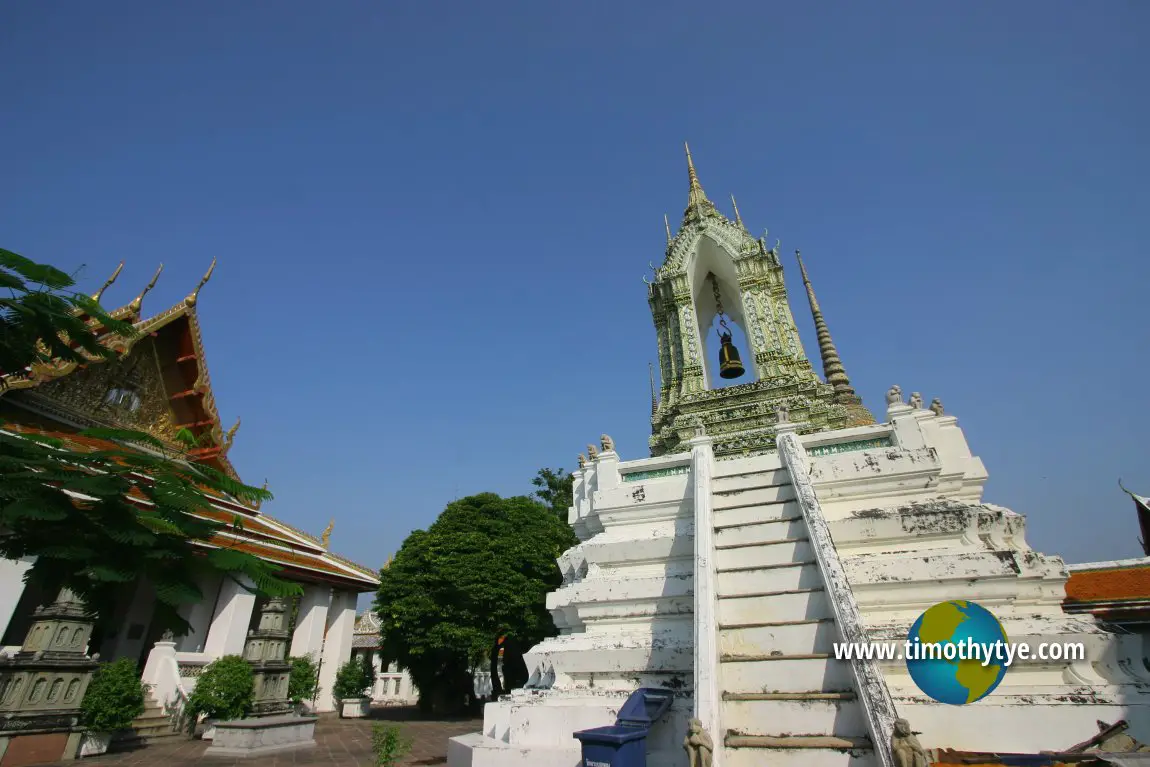 The belfry in front of Misakawan Park. (28 October, 2006)
The belfry in front of Misakawan Park. (28 October, 2006)
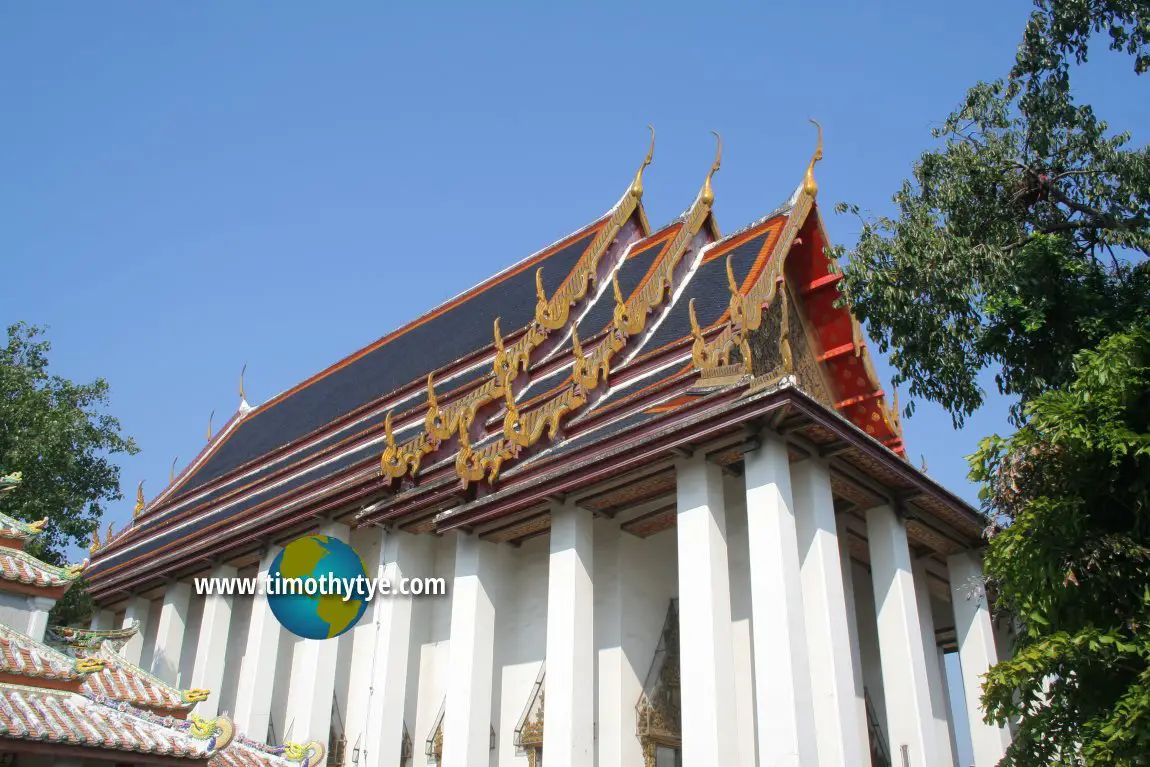 Viharn of the Reclining Buddha ระวิหารพระพุทธไสยาส
Viharn of the Reclining Buddha ระวิหารพระพุทธไสยาส 
 (28 October, 2006)
(28 October, 2006)
This is possibly the most important building in the complex. It was built by King Rama III, who first built the reclining Buddha statue before having the hall constructed over it. The statue is 46 meters long, with the Buddha's head being 15 meters high. Visitors walking around the statue will note that the sole of the Buddha's feet hold intricate pattern created using mother-of-pearl. The pattern depicts the 108 auspicious signs in Buddhism.
On the inner wall of the viharn are murals depicting the 13 Savika Etadagga Disciples, the 10 Upasaka Etadagga Disciples and the 10 Upasika Etadagga Disciples.
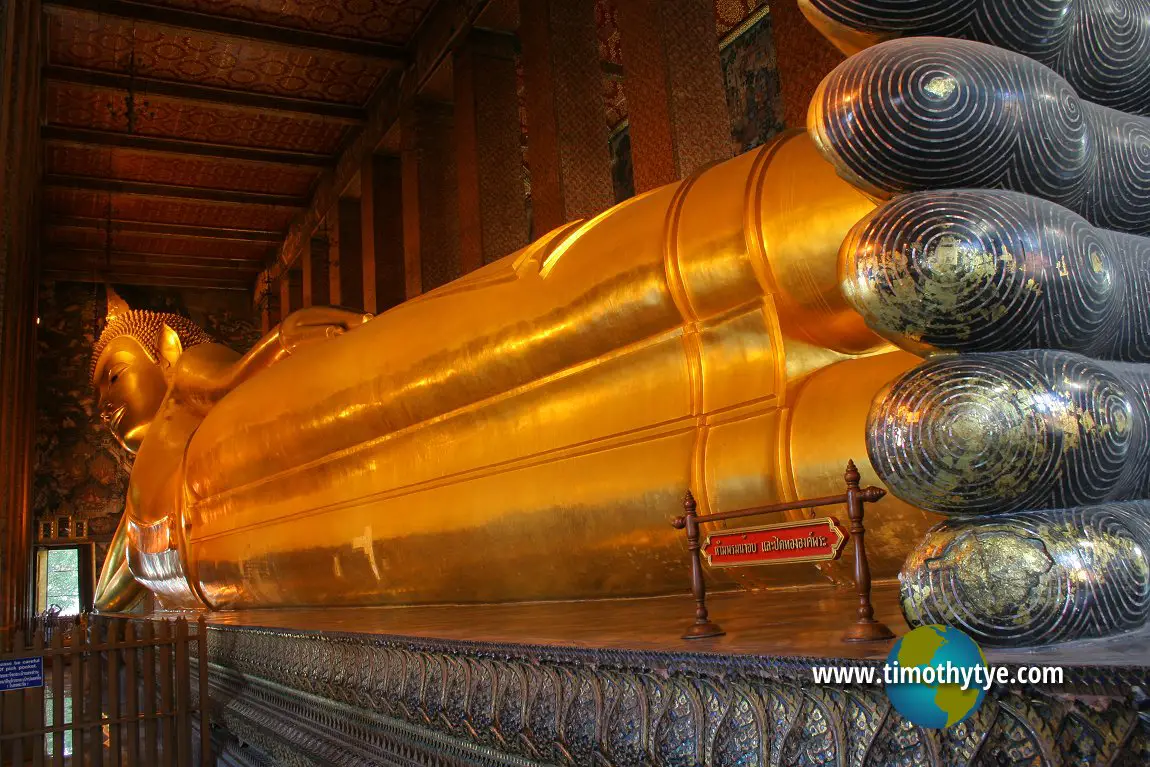 The colossal Reclining Buddha statue.
The colossal Reclining Buddha statue.  (28 October, 2006)
(28 October, 2006)
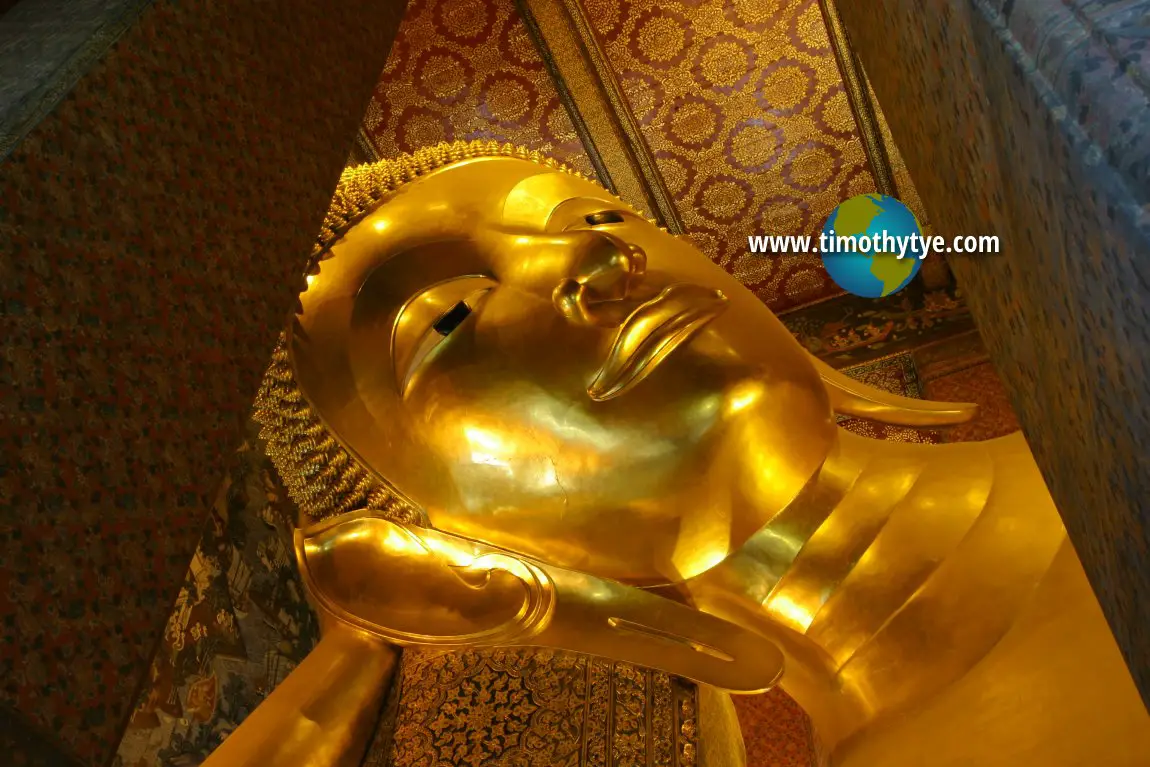 The face of the Reclining Buddha. (28 October, 2006)
The face of the Reclining Buddha. (28 October, 2006)
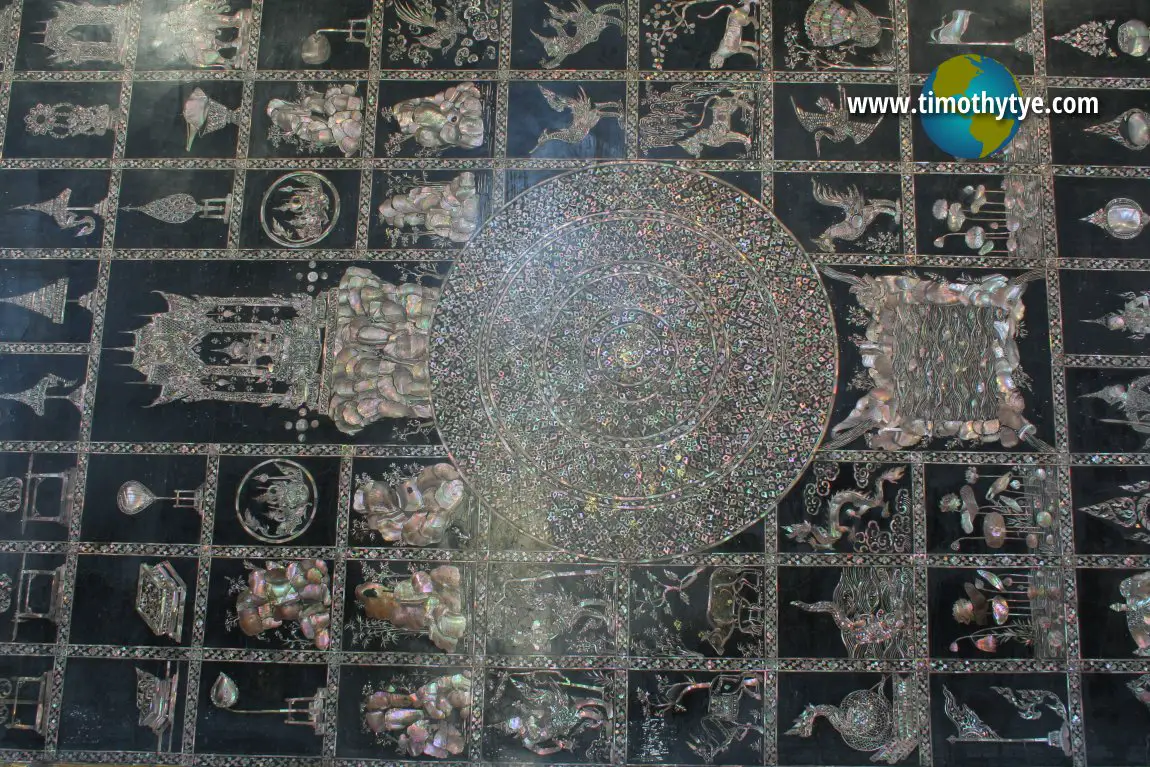 Mother-of-pearl art on the Buddha's sole.
Mother-of-pearl art on the Buddha's sole.  (28 October, 2006)
(28 October, 2006)
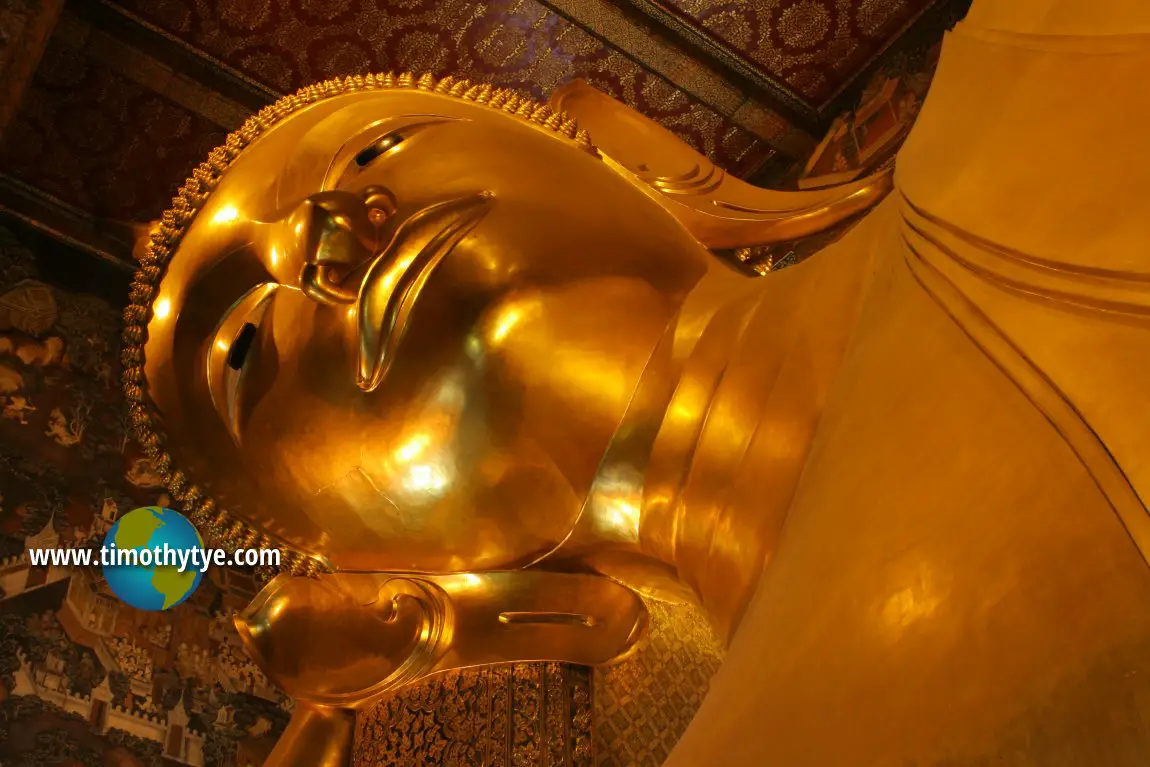 Gilded stenciling of the column and ceiling of the Viharn of the Reclining Buddha.
Gilded stenciling of the column and ceiling of the Viharn of the Reclining Buddha.  (28 October, 2006)
(28 October, 2006)
 Standing Buddhas line the cloister of the inner courtyard. (28 October, 2006)
Standing Buddhas line the cloister of the inner courtyard. (28 October, 2006)
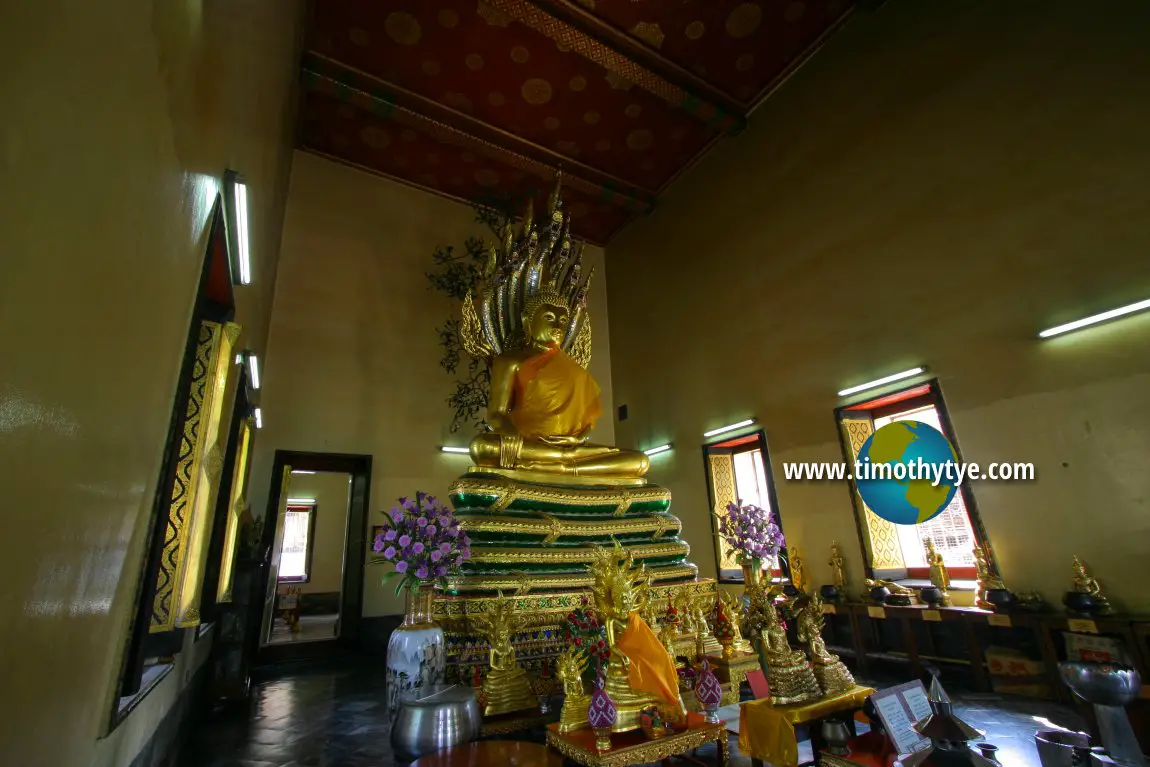 Another viharn or chapel at Wat Phra Chetuphon. (28 October, 2006)
Another viharn or chapel at Wat Phra Chetuphon. (28 October, 2006)
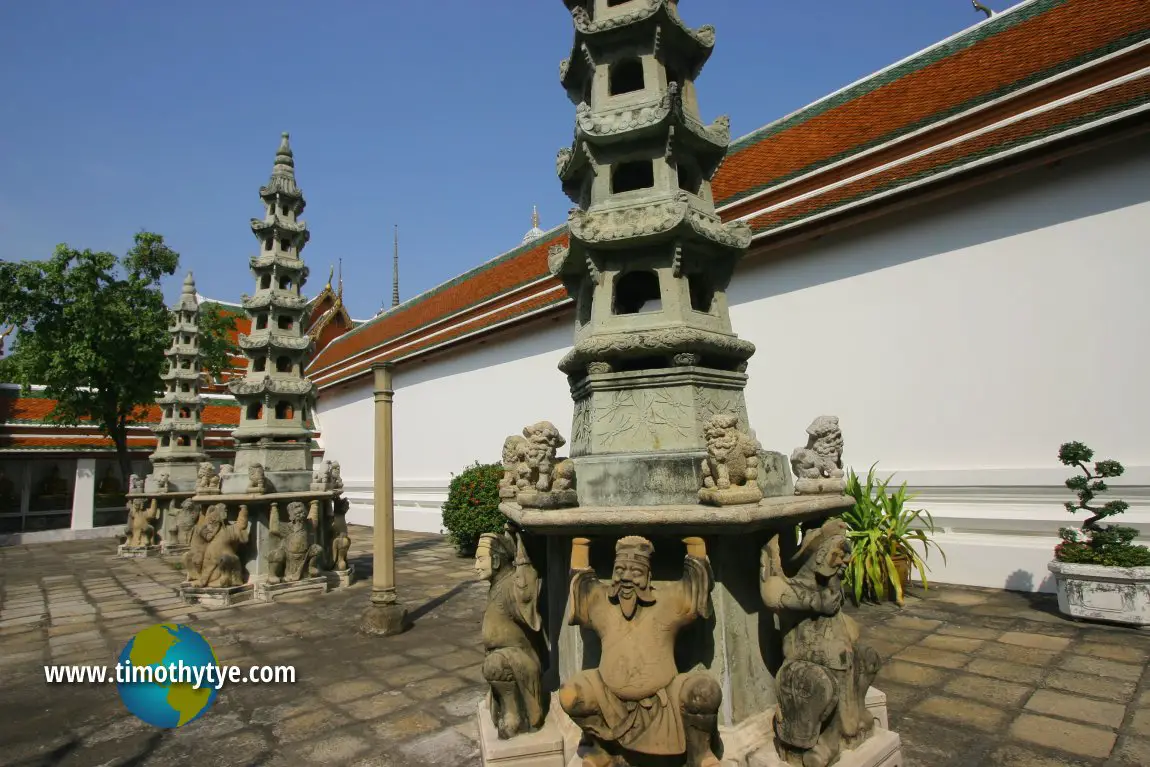 Chinese-style ornamental pagodas decorate the courtyard. (28 October, 2006)
Chinese-style ornamental pagodas decorate the courtyard. (28 October, 2006)
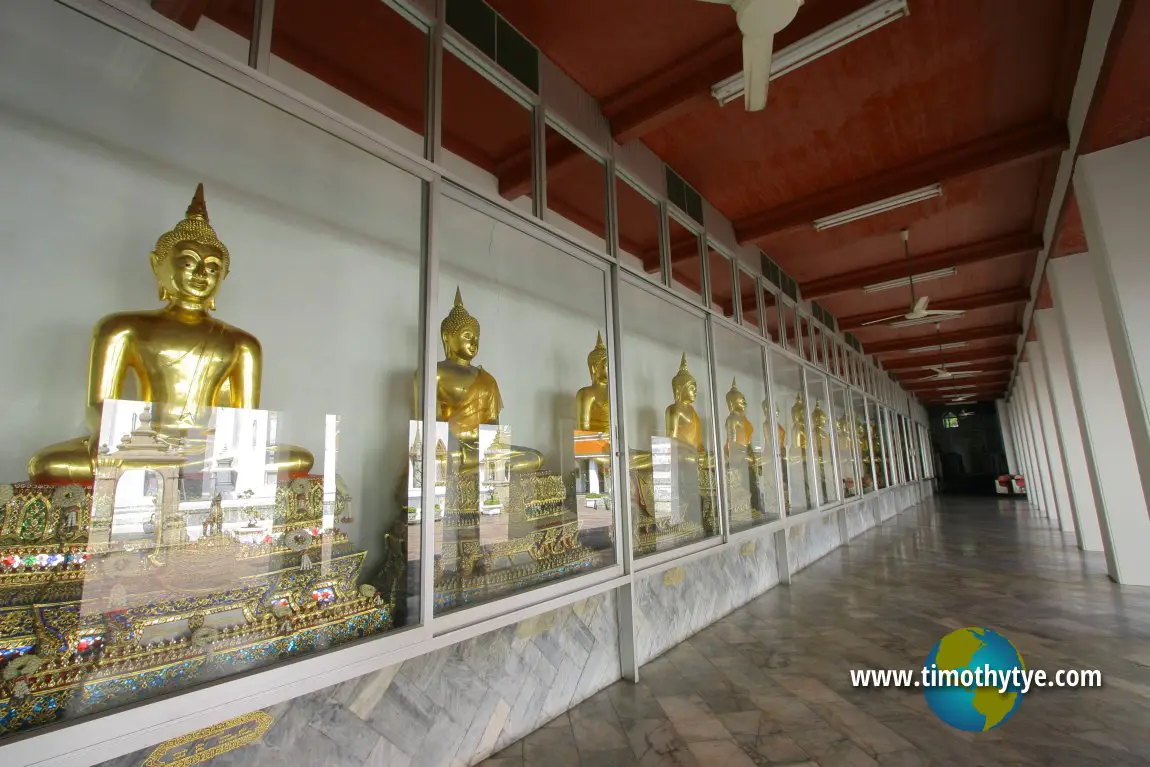 Seated Buddha statues line the cloister. (28 October, 2006)
Seated Buddha statues line the cloister. (28 October, 2006)
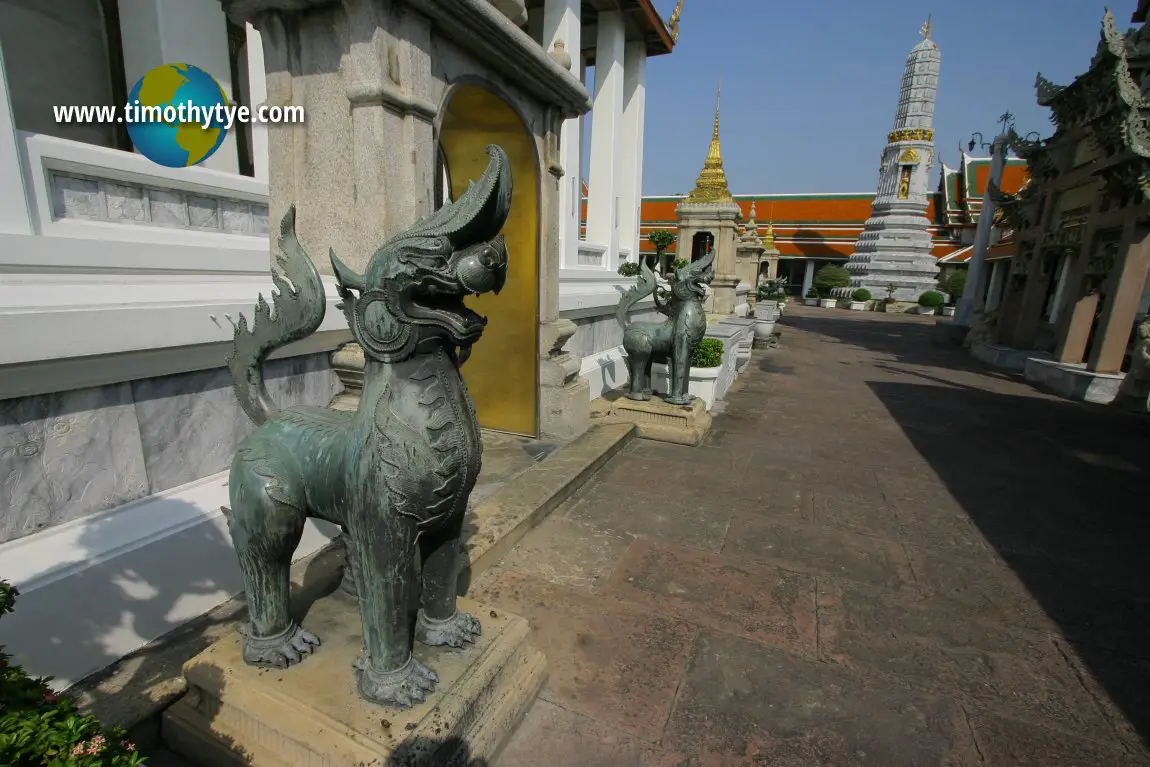 Brass guardian lion-dogs flanking an entrance. (28 October, 2006)
Brass guardian lion-dogs flanking an entrance. (28 October, 2006)
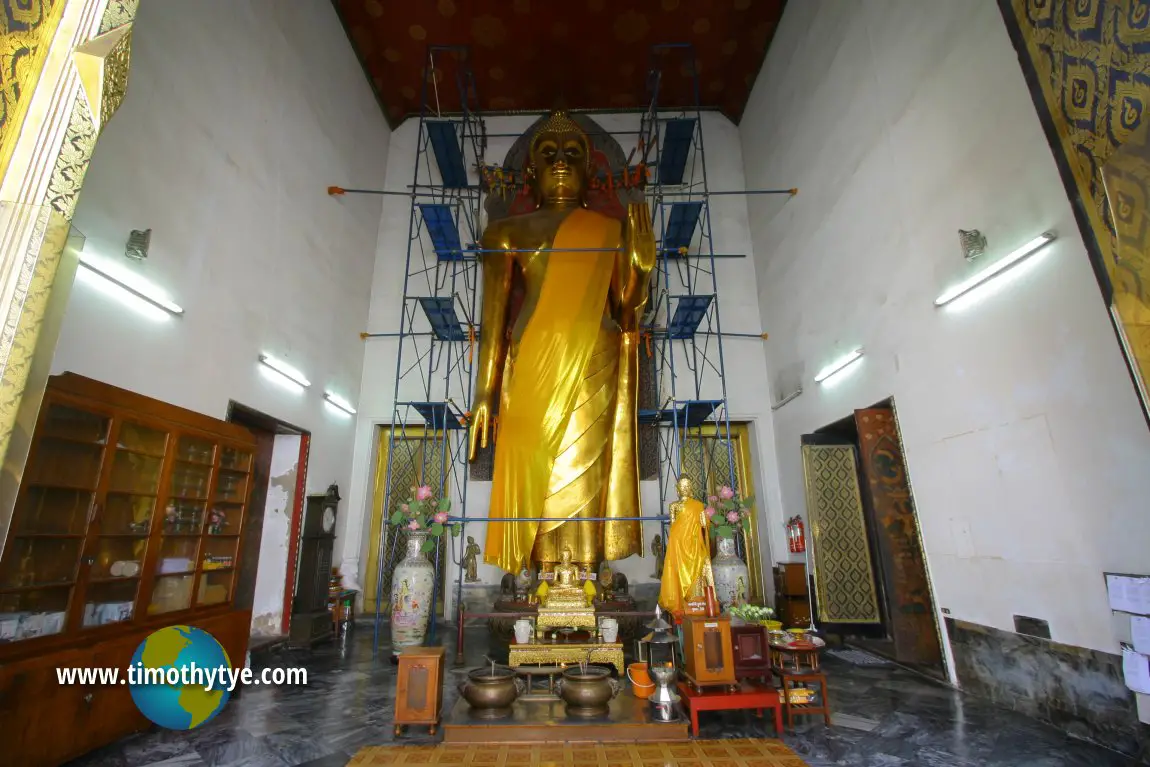 Standing Buddha in yet another viharn. (28 October, 2006)
Standing Buddha in yet another viharn. (28 October, 2006)
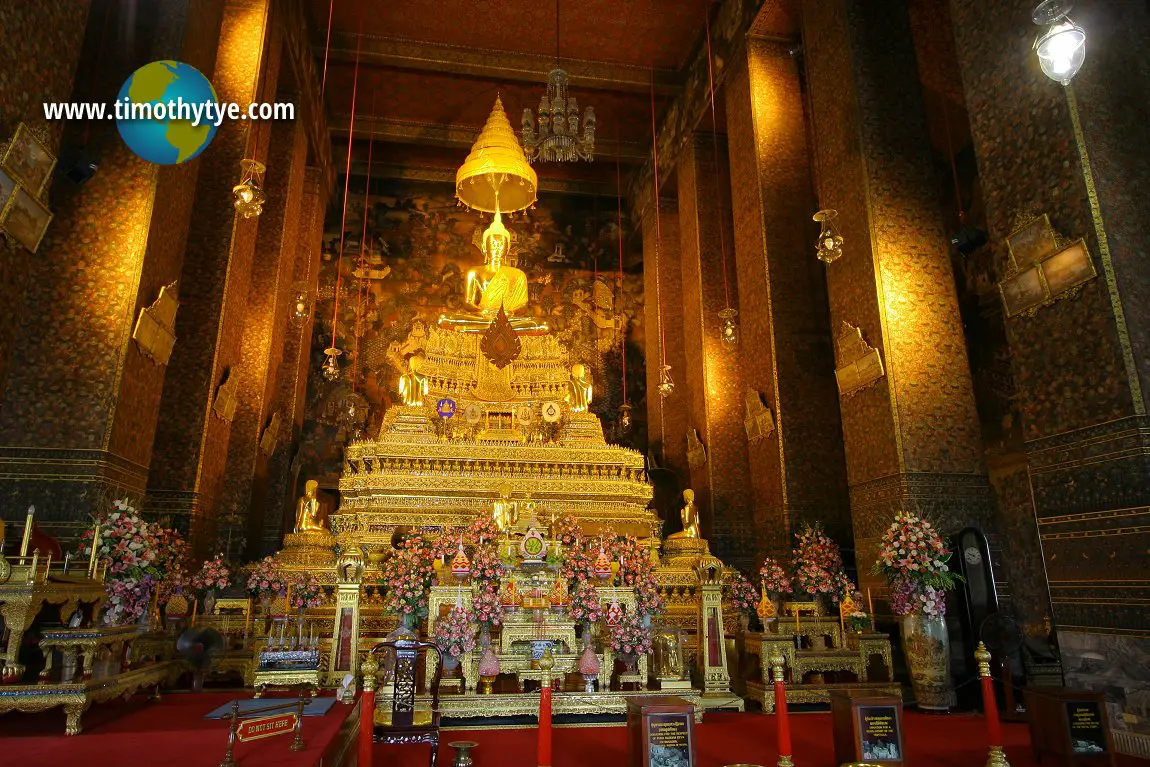 Main Buddha image in the Ubosot of Wat Phra Chetuphon. (28 October, 2006)
Main Buddha image in the Ubosot of Wat Phra Chetuphon. (28 October, 2006)
Wat Phra Chetuphon is  on the map of Bangkok
on the map of Bangkok
[an error occurred while processing this directive]List of Wats in Bangkok and Wats in Thailand; list of Districts of Bangkok
[an error occurred while processing this directive]About this website

Dear visitor, thank you so much for reading this page. My name is Timothy Tye and my hobby is to find out about places, write about them and share the information with you on this website. I have been writing this site since 5 January 2003. Originally (from 2003 until 2009, the site was called AsiaExplorers. I changed the name to Penang Travel Tips in 2009, even though I describe more than just Penang but everywhere I go (I often need to tell people that "Penang Travel Tips" is not just information about Penang, but information written in Penang), especially places in Malaysia and Singapore, and in all the years since 2003, I have described over 20,000 places.
While I try my best to provide you information as accurate as I can get it to be, I do apologize for any errors and for outdated information which I am unaware. Nevertheless, I hope that what I have described here will be useful to you.
To get to know me better, do follow me on Facebook!
Copyright © 2003-2025 Timothy Tye. All Rights Reserved.

 (Temple of the Reclining Buddha), Bangkok
(Temple of the Reclining Buddha), Bangkok Go Back
Go Back